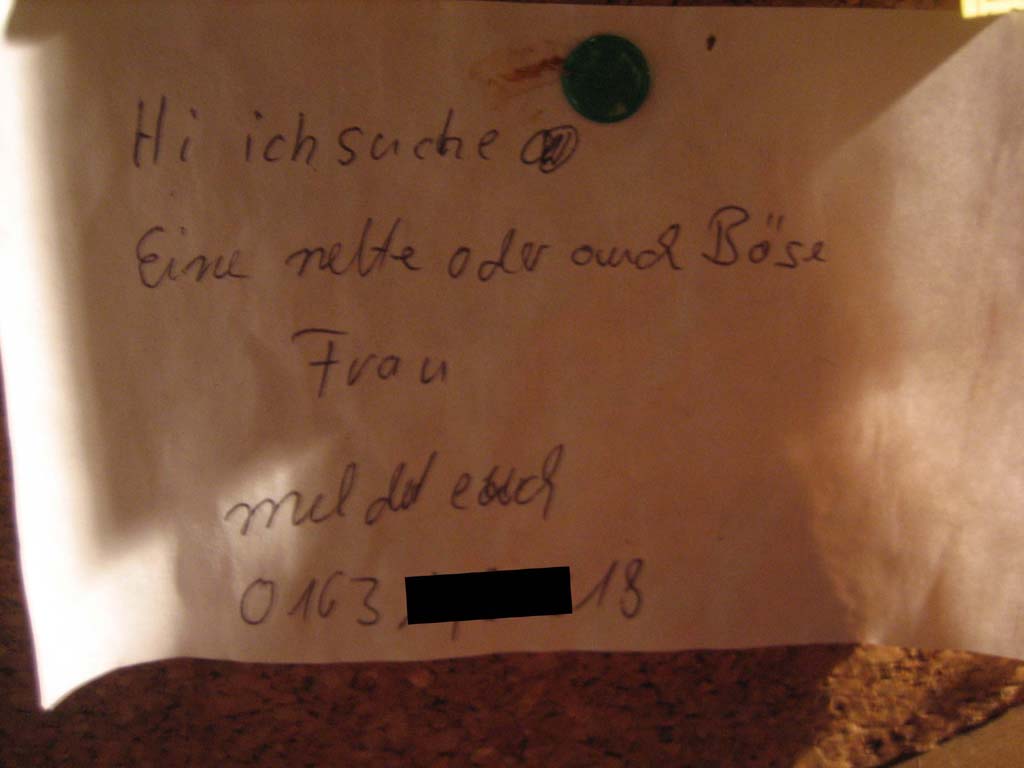For real? Haben da heute Abend Ernst A. Grandits und Ijoma Mangold von der Zeit in der 3sat Kulturzeit ernsthaft über die literarischen und gesellschaftlichen Implikationen der noch recht jungen facebook-App Bang With Friends diskutiert? Weiterlesen
Schlagwort-Archive: dating

Singles, Codes, and Evolution.
Ok, let’s face it. Mating, human mating in particular, is a complex communication process involving all sorts of biological and cultural codes that no one will ever really understand – except with hindsight, when we call it evolution, because that sounds much nicer than ignorance. Hence the proliferation of experts and (particularly paid for) advice on the matter – when no one actually knows anything, then everyone can contribute without ever really being wrong about what codes to use when.
Case in point, tonight I saw a poster ad for a singles’ party at the local university this Friday. Now I suppose some people may live under the impression that studying as a whole isn’t much more than a singles’ party, but apparently, that’s no longer the case – evolution, remember? But it wasn’t the party itself that I found interesting – apparently, the organisers are going to hand out differently coloured ribbons indicating a particular person’s willingness to flirt. While I understand that coloured ribbons or other signs have long played a certain role in identifying potential partners in particular, often sexual, subcultures, where colours are usually codes for the person’s specific preferences, I am a tad bit confused about colours indicating willingness to flirt at a singles’ party for students?
Seriously, how many different kinds of flirting are there that can be usefully differentiated? Well, I guess I have to go and see evolution with my own eyes to find out…
Falling in love, 21st century style (mostly for mice).
According to Spiegel Online (link in German), GenePartner, a Swiss company, is actually offering to match people based on their DNA structure since last July. They, like their American competitor ScientificMatch, base their product on recent research that was able to exploratorically establish an empirical preference for sexual partners with a genetically different immune system, yet with only a weak theoretical explanation for the empiric findings. While researchers in the field are apparently still modest about the importance of their findings for human mating, the two companies seem confident in their ability to identify and numerically encode the previously unconscious preferences which then allows to identify prospective mates with a different immune system and thus, it is assumed, a significant potential for a relationship. Weiterlesen
Snowball fights in the Demographic Winter
I guess this should go on afoe, but I don’t have the time for a profound comment – The Nation’s Kathryn Joyce looks at the American Christian Right’s alleged concern about the impending demise of Europe due to a relative lack of “the right babies” and a relative abundance of the wrong ones, also known as those whose parents immigrated from other (whisper: Muslim) countries. Joyce argues that those in the American Christian Right who are lobbying for this kind of thinking aren’t really concerned about Europe as such, but rather excited about the possibility of exploiting a diffuse xenophobia in Europe to find an entry point for their “family friendly” agenda. Now really.
I suppose we should be grateful though – if there’s one thing that will keep Conservative Politicians in Germany (and probably elsewhere in Europe) from advancing that kind of thinking, it is telling them that they are arguing “just like the American Christian Right.”
Blogging helps you getting laid!
Well, or something to that effect – via netzpolitik.org –
In this week’s Media Guy column for Advertising Age magazine, Dumenco contends that knowledge of the hippest, hottest blogs can increase hook-up opportunities and boost sexual attractiveness. He maintains some people are using niche blogs such as Gawker.com and Defamer.com to gain pop cultural insights that make them more socially desirable and ultimately more likely to get lucky. (source: Blog-savvy surfers in it for the sex)
It should be noted, though, that a) I’m still waiting for my first groupie, despite already having blogged since 2002 (and being a singer/songwriter, although I “ain’t a rockstar” (play song (mp3 streaming) / more of my songs) and b) German research from 2004 is underscoring my groupie-less experience. You can read what I wrote about it back then over on afoe. A little preview –
Apparently, according to the university’s press release, Prof. Schütz’ team has concluded that people who own homepages – mostly very well educated men, only 13% women – appear to be more uncertain in social conduct, less able to deal with criticism and have a more negative image of themselves than people who have not yet left any trace on a Google harddrive. Prof Schütz therefore assumes that websites are used as a substitute communication-tool because direct interpersonal contacts are more difficult to handle [for a part of] the owners of websites than for other people – even though she explicitly notes that dating is not something web authors have usually in mind….”
